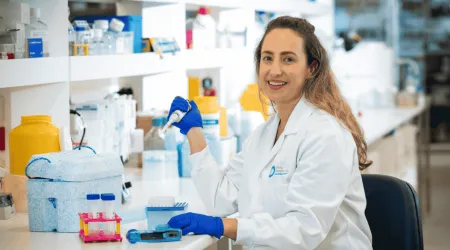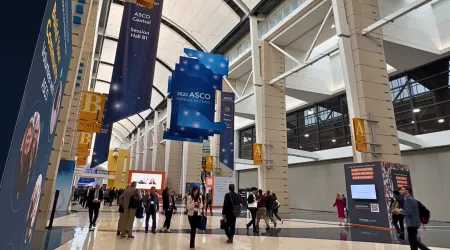
"Clinical trials gave us time": A daughter’s tribute to her mother’s courage

When Kate Shin thinks about her mother, Lynn, she remembers her strength. A first-generation Korean American, Kate grew up watching her mother — who immigrated from Incheon, South Korea, to Baltimore in the early 1970s — navigate the challenges of a new country, an arranged marriage, and, ultimately, a devastating cancer diagnosis.
At just 37, Lynn was diagnosed with stage IIb rectal cancer. It was the late 1990s, and awareness of young-onset colorectal cancer cases was far less widespread than today. Under the care of Johns Hopkins’ Sidney Kimmel Comprehensive Cancer Center, Lynn underwent radiation, surgery, and chemotherapy. For nearly a decade afterward, she remained in remission, devoted to raising Kate and her younger brother.

But nine years later, everything changed. Lynn began experiencing severe back and leg pain — symptoms that doctors initially attributed to osteoporosis. Eventually, a scan revealed the unthinkable: Lynn's cancer had returned and spread to her spine. It was now stage IV and terminal.
“She told my dad, ‘Something is really wrong,’” Kate recalls. “My dad drove her to Hopkins — because it was the best cancer center in our region — even though it was an hour away. That’s when they found it.”
Faced with limited treatment options, Lynn’s medical team introduced the possibility of clinical trials. For patients with advanced rectal cancer, trials can open the door to experimental therapies not otherwise available. Kate says the decision to enroll was both terrifying and hopeful.
“Clinical trials gave my mom more time,” she says. “She was able to see me graduate college, move to grad school, and share milestones we might not have had.”
Lynn endured years of chemotherapy, surgeries, and side effects like neuropathy. Yet she kept moving forward. She passed away in 2010 — four and a half years after her second diagnosis — leaving behind a legacy of courage and advocacy that still drives her daughter today.
Now 40, Kate continues to honor her mother by spreading awareness about screening. Because of her family history, she began colonoscopies at 28 and has had four so far.
“Screening saves lives,” she says. “If my mom’s cancer had been found even earlier, things might have been different.”
Through her story, Kate hopes others will understand that access to care, to information, and to clinical trials can make all the difference.
“I’m so grateful,” she says. “Clinical trials didn’t cure her cancer, but they gave us time. And that time meant everything.”
For people with rectal cancer, there haven’t been many breakthroughs in years. We are grateful to Akamis Bio for supporting this story to create awareness about clinical trials and the importance of knowing all options when making treatment decisions. You can learn more about their FORTRESS study for locally advanced rectal cancer (LARC) at fortressstudy.org.
This story was created with support from
Top resources

Where breakthroughs begin: Project Cure CRC spotlight on Dr. Lisa Mielke
hrough Project Cure CRC, the Alliance is fueling bold, early-stage research with the potential to transform colorectal cancer treatment. Dr. Lisa Mielke’s groundbreaking work explores how the gut’s immune system and nerve signaling influence cancer growth—opening the door to new therapeutic approaches, including repurposed existing drugs. This is what’s possible when promising ideas get the support they need to move forward.

John E.: Biomarker testing uncovered a pivotal treatment option
After a grim prognosis, biomarker testing revealed a targeted treatment option for John E. Learn how knowing your biomarkers can change what’s possible.

2025 ASCO update: Six big studies
The 2025 ASCO Annual Meeting featured several important studies that could change how colorectal cancer is treated, including a pivotal study for BRAF V600E patients.






